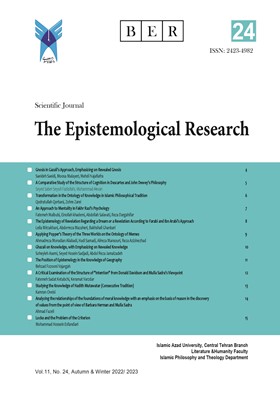Locke and the Problem of the Criterion
Subject Areas : Epistemological researches
1 - Doctor of Philosophy, University of Isfahan, Isfahan, Iran
Keywords: naturalized Epistemology, John Locke, the Problem of the Criterion, Methodism, Innate Knowledge,
Abstract :
In the literature on the problem of the criterion, John Locke is described as a methodist: one who prioritizes the criterion of knowledge over its extent and believes that based on the criterion of knowledge, its extent can be determined. However, there is no independent research to substantiate this description. That is the arguments and evidence confirming that Locke is a methodist have not been presented and examined independently. The following article addresses this issue. Hence, the author after a brief review of the problem of the criterion and its background provides the reasons and evidence that Locke is a methodist, including the argument based on 'no innate knowledge', the argument based on 'tabula rasa', and the argument based on the rejection of epistemic authoritarianism. Then, the nature of his Methodism and, indeed, Locke's view of the criterion of knowledge are discussed. During this discussion, it is examined whether Locke considers the criterion of knowledge to be related to the achievement of knowledge or justification. Then, it is argued that if the criterion of knowledge in Locke's view is related to the achievement of knowledge, should his epistemology be considered naturalized? And if so, what is the significance of Locke's discussion of the primacy of the criterion of knowledge over its extent, which is a normative discussion?
بریه، امیل. (1390). تاریخ فلسفۀ قرن هفدهم. اسماعیل سعادت، تهران: هرمس.
ردهد، برایان. (1375). اندیشۀ سیاسی از افلاطون تا ناتو. مرتضی کاخی و اکبر افسری، تهران: آگه، دوم.
لو، ای جاناتان. (1386). کتابِ راهنمای جستار در باب فاهمۀ بشری لاک، ابوالفضل حقیری، تهران: حکمت.
Allen, Keith. (2013). "Locke and Sensitive Knowledge." Journal of the History of Philosophy, vol. 51, no. 2. 249–266.
Chisholm, Roderick M.(1982). The foundations of knowing. Minneapolis: University of Minnesota Press.
Jolley, Nicholas. (1999). Locke: his philosophical thought. New York: Oxford University Press.
Locke, John. (2004). An Essay concerning Human Understanding. Edited by Roger Woolhouse, London: Penguin Books.
Kornblith, Hilary. (1994). "What Is Naturalistic Epistemology?" In: Naturalizing epistemology, Edited by Hilary Kornblith, Cambridge: The MIT Press, 1-14.
Moore, G. E. (1925). "A Defence of Common Sense." In: Moore, G. E, (2013), Philosophical Papers. New York: Routledge.
Quine, W. V. O. (1969). "Epistemology Naturalized." In: Ontological Relativity and Other Essays, New York: Columbia University Press. 69-90.
Quine, W. V. O. (1995). From Stimulus to Science. Cambridge: Harvard University Press.
Rickless, Samuel C. (2008). "Is Locke's Theory of Knowledge Inconsistent?" Philosophy and Phenomenological Research, Vol. 77, No. 1. 83-104.
Rickless, Samuel C. (2015). "Degrees of Certainty and Sensitive Knowledge: A Reply to Soles", Locke Studies, 15: 99-109.
Rockwood, Nathan. (2013). "Is Sensitive Knowledge 'Knowledge'?" Locke Studies, 13: 15-30.
Williamson, Timothy. (2007). The Philosophy of Philosophy. Oxford: Blackwell Publishing.
_||_


